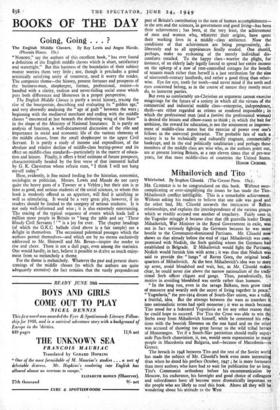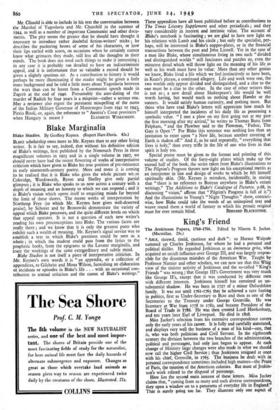Whirlwind. By Stephen Clissold. (The Cresset Press- .1.5s),,
MR. CLISSOLD is to be congratulated on this boolt. Without over- "; complicating or over-simplifying the issues he has made the Tito, Mihailovich conflict intelligible. This is a remarkable achievement. !" Without asking his readers to believe that one side was good and : the other bad, Mr. Clissold unravels the intricacies Of Balkan relationships, and explains the interdependence of the various groups which so readily accused one another of treachery. Fairly soon in the Yugoslav struggle it became clear that the guerrilla leader Draza Mihailovich, War Minister in the Royal Government in exile, was not in fact seriously fighting the Germans because he was more hostile to the Communist-dominated Partisans. Mr. Clissold now 1. shows us that already before the end of -1941 Mihailovich was com- promised with Nedich, the Serb quisling whom the Germans had established in Belgrade. If Mihailovich would fight, the Partisans; Nedich would furnish him with arms ; it was thus that Nedich was said to provide the. " lungs " of Ravna Gora the original head- quarters of Mihailovich. At the best Mihailovich's idea was to store up arms, avoid bloodshed and wait, but, as Mr. Clissold makes clear, he could never rise above the narrow nationalism of the tradi tional Serb officer cliques and gangs. Thus, paradoxically, his motive in avoiding bloodshed was sterile rather than humane. " In the long run, even in the savage Balkans, men. grow tired of massacre and wearily seek the secret of living together in peace." " Yugoslavia " the pre-1914 dream of South-Slav union, was a valid, a fruitful, idea. But the attempt between the wars to translate it into nationalistic terms had spelt nonsense • it was as much because Tito stood for a federated Yugoslavia as for any- other reason that he could hope to succeed. For Tito the Croat was able to win the Serbs away from Mihailovich himself, while he cemented his rela- tions with the boorish Slovenes on the one hand and on the other was accused of showing too great favour to the wild tribal heroes of Montenegro. Yet if a South-Slav patriotism should really super-, 'sede Pan-Serb chauvinism, it, too, would seem expansionist to many people in Macedonia and Bulgaria, and—because of Macedonia—in
Greece. • The breach in 1948 beflveen Tito and the rest of the Soviet worli has made the subject of Mr. Clissold's book even more interestin than when he dated his preface October, 5947 ; he is more fortunate than most authors who have had to wait for publication for so long. Tito's, Communist orthodoxy before his excommunication by Moscow his endurance, his foresight and good choice of colleagues and subordinates have all become more dramatically important to the people who are likely to read this book. Above all they will be wondering about his attitude to the West
Mr. Clissold is able to include in his text the conversation between the Marshal of Yugoslavia and Mr. Churchill in the summer of 1944, as well as a number of important Communist and other docu- ments. The pity seems the greater that he should have thought it necessary to introduce rather doubtful fiction-writers' tricks ; he describes the puckering brows of some of his characters, or how their lips curled with scorn, on occasions when he certainly cannot know what grimaces they made, still less all the thoughts in their minds. The book does not need such things to make it interesting-; in any case it is probably too detailed to have an indiscriminate appeal, and it is unfortunate that so valuable a record should be given a slightly spurious air. As a contribution to history it would perhaps be more illuminating if the reader might be given a little more background and be told a little more about Yugoslavia between the wars than can be learnt from a Communist speech made in Zagreb at the end of 194o. Presumably the ante-dating of the murder of Radich by four years is a misprint—rather a serious one. May a reviewer also regret the persistent misspelling of the name Of the Italian Military Governor of Montenegro from 1941 to 1943, Pirtio Biroli, or, again, the reference to*" Austria's Croat provinces"



































 Previous page
Previous page